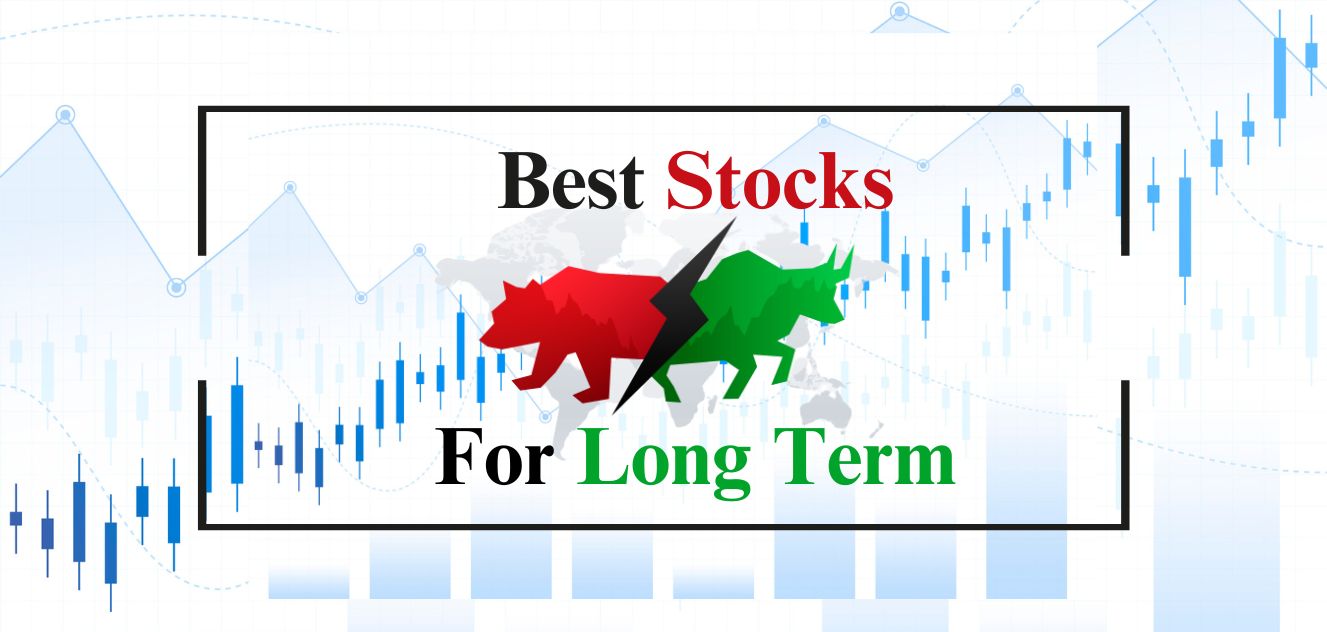Are you looking for stock investments that can help you build long-term wealth and are in line with your financial goals? With the wide range of investment options in the stock market, finding the most suitable long-term stocks to buy and hold can be challenging. Now, let’s explore the leading long-term stock investments that consistently deliver impressive returns and exhibit promising potential for future growth. This guide is crafted to meet the needs of experienced investors and newcomers, providing valuable insights and expertise to assist you in making informed investment choices.
Understand Long-Term Stocks
Various strategies should be considered when investing in the stock market. One approach that has proven effective for many investors is focusing on long-term stocks. But what exactly are long-term stocks, and how can they help you achieve your financial goals?
Defining Long-Term Stocks
Long-term stocks refer to shares in companies expected to perform well over an extended period, typically five years or more. These stocks are often characterised by stable financials, a competitive advantage, growth potential, resilience, and strong management.
Key Characteristics of Long-Term Stocks
- Stable Financials: Long-term stocks typically have strong balance sheets, consistent profitability, and steady cash flows.
- Competitive Advantage: These companies have unique products, services, or business models that provide a sustainable edge.
- Growth Potential: Long-term stocks often have opportunities for expansion, innovation, and increasing market share.
- Resilience: These companies can weather economic downturns and industry disruptions.
- Strong Management: Experienced leadership with a proven track record is a hallmark of long-term stocks.
Benefits of Investing in Long-Term Stocks
- Ride out Market Fluctuations: Long-term investors can weather market ups and downs.
- Compounding Returns: Long-term stocks can benefit from compounding returns over time.
- Fundamental Analysis: Investors focus on a company’s underlying fundamentals rather than short-term market trends.
- Dividend Income: Some long-term stocks offer steady dividend income.
Examples of Long-Term Stocks
- Blue-chip Companies: Johnson & Johnson, Procter & Gamble
- Technology Leaders: Amazon, Microsoft
- Healthcare Innovators: Pfizer, UnitedHealth Group
- Consumer Staples: Coca-Cola, McDonald’s
- Dividend Aristocrats: 3M, ExxonMobil
Long-term stocks offer a promising approach to investing in the stock market. By focusing on companies with stable financials, competitive advantages, and growth potential, investors can build a portfolio that can weather market fluctuations and generate steady returns over time.”
Things to Consider Before Investing in Long-Term Stocks
Before investing in long-term stocks, there are several important factors to consider:
1. Financial Goals: Clearly define your investment objectives and determine your risk tolerance.
2. Research: Thoroughly investigate the company’s financial health, products, leadership, and industry trends.
3. Risk Assessment: Understand the potential risks and market volatility associated with the stock.
4. Diversification: Spread your investments across different sectors and industries to reduce risk exposure.
5. Time Horizon: Ensure that your investment timeline aligns with the long-term growth potential of the stock.
6. Valuation: Evaluate the stock’s valuation metrics (such as the price-to-earnings ratio) to ensure it is reasonably priced.
7. Competitive Advantage: Assess the company’s competitive edge and ability to sustain it.
8. Management Team: Evaluate the experience and track record of the company’s management team.
9. Industry Trends: Understand the industry’s growth prospects and potential disruptions.
10. Economic Conditions: Consider the potential impact of economic conditions, such as interest rates and inflation, on the stock.
11. Tax Implications: Understand the tax implications of investing in long-term stocks.
12. Regular Monitoring: Review and adjust your investment portfolio regularly to align with your goals.
13. Patience: Long-term investing requires patience, as it may involve holding onto investments for an extended period.
14. Dollar-Cost Averaging: Consider using a dollar-cost averaging strategy to mitigate timing risks.
15. Professional Advice: Seek guidance from a financial advisor or broker if necessary.
How to Invest in the Best Long-Term Stocks in India?
By carefully evaluating these factors, you can make well-informed investment decisions aligned with your goals.
When looking to invest in the best long-term stocks in India, it’s essential to follow a series of steps:
1. Open a Demat Account: Get started by creating a Demat account with a reputable brokerage firm to store your shares electronically.
2. Choose a Brokerage Platform: To facilitate buying and selling shares, select a reliable online trading platform or mobile app.
3. Fund Your Account: Deposit funds into your trading account to kickstart your investment journey.
4. Research and Select Stocks: Analyze financial performance, industry trends, and competitive advantage to identify promising long-term stocks in India.
5. Set Investment Goals: Define your investment objectives, risk tolerance, and time horizon.
6. Start Investing: Initiate investments in your selected stocks through your chosen brokerage platform.
7. Diversify Your Portfolio: Spread your investments across different sectors and industries to minimize risk.
8. Monitor and Rebalance: Review your portfolio regularly and adjust it as necessary to ensure it remains in line with your objectives.
9. Consult a Financial Advisor: When needed, seek advice from a financial advisor or broker for personalized investment guidance.
Remember to prioritize self-education, establish clear goals, and adopt a patient approach to investing for the long term.
Best Long-Term Stock Investments in 2024
Sure, here is the information about the top long-term stock investments:
1. Hindustan Unilever Ltd (HUL)
– Industry: FMCG (Fast Moving Consumer Goods)
– Market Cap: ₹6,50,000 cr
– Dividend Yield: 3.5%
– ROE (Return on Equity): 20%
– Debt-to-Equity Ratio: 0.05
HUL is a leading FMCG company with well-known food, beverages, personal care, and home care brands. Its famous brands include Lux, Lifebuoy, Surf Excel, and Kissan.
2. Bajaj Auto Ltd
– Industry: Automotive (Two-Wheelers)
– Market Cap: ₹1,20,000 cr
– Dividend Yield: 2.5%
– ROE (Return on Equity): 25%
– Debt-to-Equity Ratio: 0.10
Bajaj Auto is a dominant player in the two-wheeler industry and has a strong brand presence. Its popular models include Pulsar, Platina, and CT.
3. Zydus Lifesciences Ltd
– Industry: Pharmaceuticals
– Market Cap: ₹50,000 cr
– Dividend Yield: 1.5%
– ROE (Return on Equity): 18%
– Debt-to-Equity Ratio: 0.20
Zydus Lifesciences is a pharmaceutical company specializing in research and development. Its products include medications for diabetes, cardiovascular disease, and oncology.
4. LTIMindtree Ltd
– Industry: IT Services and Consulting
– Market Cap: ₹1,00,000 cr
– Dividend Yield: 1.2%
– ROE (Return on Equity): 22%
– Debt-to-Equity Ratio: 0.05
LTIMindtree is a leading IT services and consulting company with expertise in digital transformation, cloud computing, and cybersecurity.
5. Pidilite Industries Ltd
– Industry: Adhesives and Construction Chemicals
– Market Cap: ₹25,000 cr
– Dividend Yield: 1.8%
– ROE (Return on Equity): 20%
– Debt-to-Equity Ratio: 0.15
Pidilite Industries is a market leader in the adhesives and construction chemicals industry. Its famous brands include Fevicol, Dr Fixit, and Roff.
6. Asian Paints Ltd
– Industry: Paints
– Market Cap: ₹2,50,000 cr
– Dividend Yield: 1.2%
– ROE (Return on Equity): 25%
– Debt-to-Equity Ratio: 0.05
– Brands: Asian Paints, Apco Coatings, Scib Paints
7. Nestle India Ltd
– Industry: FMCG
– Market Cap: ₹1,80,000 cr
– Dividend Yield: 1.5%
– ROE (Return on Equity): 20%
– Debt-to-Equity Ratio: 0.10
– Brands: Maggi, Nescafe, KitKat, Cerelac
8. Mahindra & Mahindra Ltd
– Industry: Diversified Conglomerate
– Market Cap: ₹1,20,000 cr
– Dividend Yield: 1.2%
– ROE (Return on Equity): 15%
– Debt-to-Equity Ratio: 0.20
– Businesses: Automotive, Farm Equipment, IT, Financial Services
9. Tata Consultancy Services Ltd (TCS)
– Industry: IT Services and Consulting
– Market Cap: ₹12,00,000 cr
– Dividend Yield: 1.5%
– ROE (Return on Equity): 25%
– Debt-to-Equity Ratio: 0.05
– Services: IT Consulting, Digital Transformation, Cloud Computing
10. Procter & Gamble Hygiene and Health Care Ltd
– Industry: FMCG
– Market Cap: ₹50,000 cr
– Dividend Yield: 1.8%
– ROE (Return on Equity): 20%
– Debt-to-Equity Ratio: 0.10
– Brands: Vicks, Oral-B, Head & Shoulders, Whisper
Conclusion
Ultimately, long-term stock investments offer a great chance to build wealth and achieve financial goals. The article highlights the top long-term stocks that can provide investors with a reliable source of returns and growth potential. Conducting thorough research, maintaining a diversified portfolio, and seeking guidance from a financial advisor are essential steps to consider before making investment choices. This professional support can provide you with reassurance and confidence in your investment decisions. With a strategic mindset, you can unlock the full potential of stock investments and protect your financial well-being, feeling empowered and in control of your investment decisions.
FAQs
Q. How do I choose the best long-term stocks?
A. Conduct thorough research and consider financial health, industry trends, and competitive advantage factors.
Q. Can I invest in long-term stocks with little money?
A. Yes, consider investing small amounts regularly through dollar-cost averaging.
Q. How long should I hold onto long-term stocks?
A. Hold for 5 years or more to ride out market fluctuations and benefit from compounded returns.




